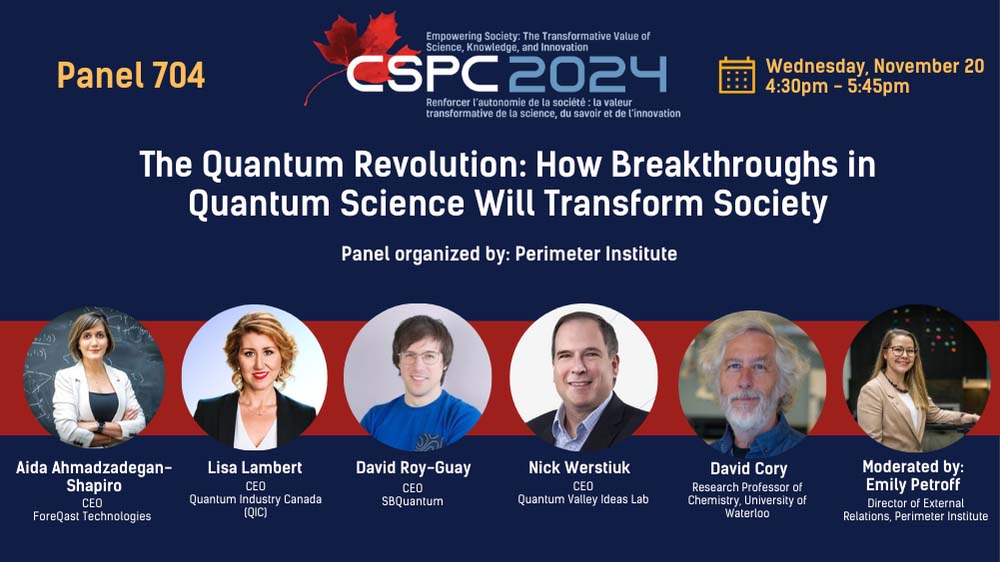Abstract:
The quantum revolution holds the promise of transformative impacts across science, technology, and society. This panel discussion explores the implications of quantum science, exploring how breakthroughs might impact our daily lives. From the potential of quantum computing to revolutionize data processing with unparalleled computational power, to the myriad applications of quantum sensing in aerospace, medicine, and navigation, the implications are vast. Join us as we discuss the profound implications of quantum science and a future defined by quantum possibilities.
Summary of Conversations
The panel explored quantum technology’s diverse applications beyond computing, including AI-enhanced optimization, quantum sensing for Earth and space, and structural biology. Discussions highlighted quantum’s potential for advancements in structural biology, eye health, and spintronics, with the potential to impact industries like mining and navigation. The Canadian quantum landscape was lauded for its entrepreneurial mindset and multidisciplinary approach, but concerns were raised about the need for increased investment to maintain competitiveness. Panellists emphasized the importance of focus, collaboration, and building bridges between fundamental research and commercial applications. Addressing scalability challenges, the panel stressed the need for innovation in fabrication, supply chain management, and talent development to move beyond artisanal creation toward scalable production.
Take Away Messages/ Current Status of Challenges:
Here are the key takeaways from the discussion:
- Quantum technology offers diverse applications beyond computing, impacting sectors like healthcare, navigation, and materials science.
- Canada holds a strong position in quantum SMEs and research, but risks losing its competitive edge due to limited commercial investment compared to its global counterparts.
- The panel identified a need for focus and a strategic mindset to ensure research translates into tangible products and businesses.
- Challenges persist in scaling quantum technologies, particularly in fabrication, supply chain complexities, and talent acquisition.
- Quantum requires a multidisciplinary approach, connecting expertise in physics, engineering, and business.
- Concerns were raised about the potential for overhyping quantum computing while undervaluing other applications.
- Geopolitical considerations and economic security are becoming increasingly relevant in quantum supply chains.
- Innovation in this field is not limited to universities but also occurs within startups and companies.
Recommendations/Next Steps:
Here are the key recommendations and action items suggested during the discussion:
- Increase targeted investment in commercialization to bridge the gap between research and market-ready applications.
- Streamline R&D funding processes and increase check sizes to support impactful technology development.
- Refocus innovation policy to emphasize commercialization and support actors who drive innovation beyond invention.
- Encourage government procurement of quantum technologies to foster early adoption and signal confidence in Canadian innovation.
- Promote multidisciplinary collaboration to drive innovation and address skills gaps in fabrication and engineering.
- Develop clear messaging around quantum technologies to temper hype, communicate realistic benefits, and broaden public understanding.
- Address workforce shortages through education, immigration, and skills training programs.
- Foster strategic partnerships with like-minded countries to build secure and resilient supply chains.
* This summary has been generated with the assistance of AI tools


